Boost Your Online Presence with Effective Web Page Optimization


Introduction
In the vast ocean of the internet, where countless websites vie for attention, how can you ensure that your own digital presence stands out? The answer lies in the art of web page optimization. By implementing effective optimization strategies, you can catapult your website to the top of search engine results pages, increase organic traffic, and captivate your target audience. In this comprehensive guide, we will explore the ins and outs of web page optimization, unveiling powerful techniques to help you achieve maximum online visibility and surpass your competition.
Table of Contents
Unveiling the Foundations of Web Page Optimization
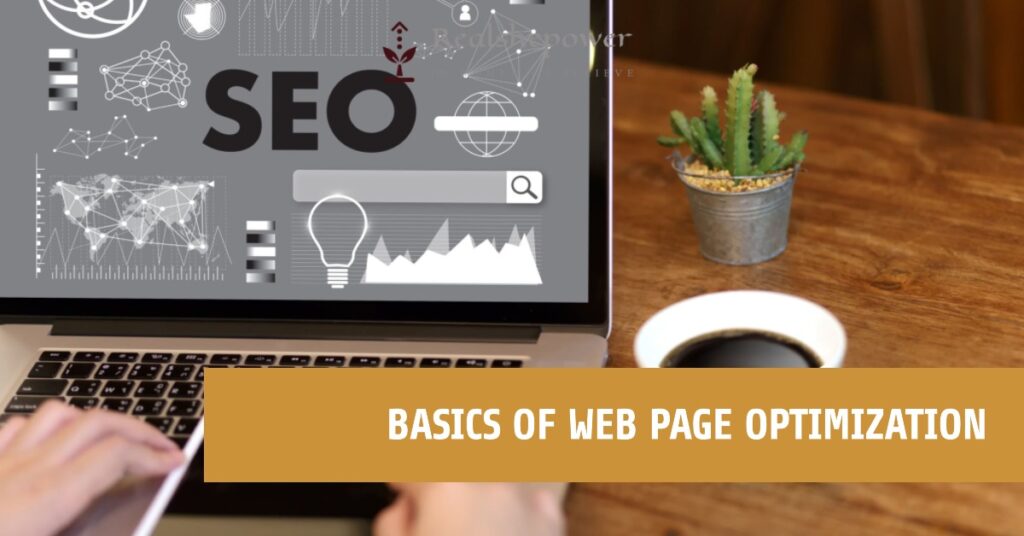
Understanding the Significance of Web Page Optimization
Web page optimization is the process of fine-tuning various elements of your website to improve its visibility in search engine rankings. By optimizing your web pages, you can enhance their relevance, authority, and user-friendliness, making them more appealing to both search engines and human visitors.
The Role of Keywords in Web Page Optimization
Keywords form the backbone of web page optimization. These are the words and phrases that users enter into search engines when looking for information or solutions. Integrating relevant keywords throughout your web page content enables search engines to understand the relevance of your page to specific queries.
Crafting Engaging and Keyword-Rich Content
Web page optimization requires you to create high-quality content that not only appeals to your audience but also aligns with search engine algorithms. Here’s how you can achieve the perfect balance:
- Conduct thorough keyword research to identify the terms and phrases that your target audience is searching for.
- Seamlessly integrate keywords into your content, ensuring they flow naturally and add value to the overall user experience.
- Leverage the power of headings and subheadings (like this one) to structure your content and highlight important information.
- Incorporate bullet points and numbered lists to break down complex information and enhance readability.
Meta Tags and Their Impact on Optimization
Meta tags, including meta titles and meta descriptions, play a crucial role in web page optimization. These tags provide concise summaries of your web page content and appear in search engine results. Optimizing your meta tags involves:
- Crafting compelling meta titles that accurately represent your content and contain relevant keywords.
- Writing persuasive meta descriptions that entice users to click through to your website while incorporating target keywords.
Unleashing Advanced Web Page Optimization Strategies
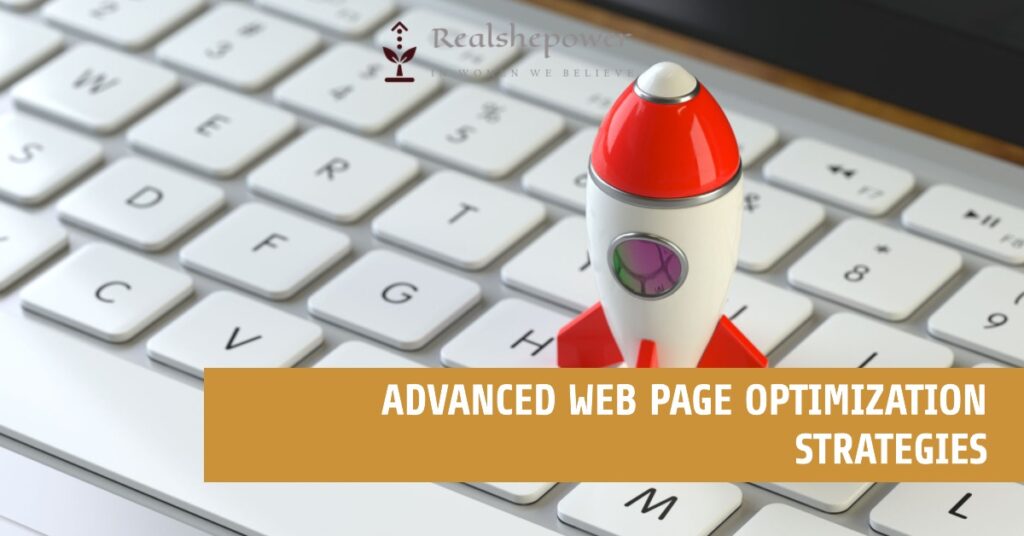
Enhancing Website Speed and Performance
Web page optimization extends beyond content and keywords. It also encompasses technical aspects that influence user experience, such as website speed and performance. Improve these elements by:
- Optimizing image sizes to reduce page load times.
- Enabling browser caching to store frequently accessed files on users’ devices.
- Minifying code to reduce file sizes and enhance website performance.
- Implementing content delivery networks (CDNs) to distribute content across multiple servers for faster loading.
Embracing Mobile Optimization
In the era of smartphones and tablets, optimizing your web pages for mobile devices is no longer optional. Ensure your website provides a seamless mobile experience by:
- Adopting responsive design principles that adapt your site’s layout and content to different screen sizes.
- Optimizing images and media for mobile devices to minimize data usage and improve loading times.
- Streamlining navigation menus and touch elements for easy mobile navigation.
Harnessing the Power of Backlinks
Backlinks, or incoming links from external websites, are a significant factor in search engine algorithms. Building a robust backlink profile helps improve your web page’s authority and boosts its visibility. Here’s how you can obtain valuable backlinks:
- Create high-quality content that naturally attracts backlinks from other websites.
- Seek out relevant directories, industry blogs, and influencers to feature your content and earn backlinks.
- Engage in guest blogging opportunities to showcase your expertise and acquire authoritative backlinks.
Analyzing and Monitoring Performance

Utilizing Web Analytics Tools
To gauge the effectiveness of your web page optimization efforts, it’s crucial to employ web analytics tools. These tools provide valuable insights into various metrics, including website traffic, user behavior, and conversion rates. Key web analytics tools to consider are:
- Google Analytics: A comprehensive and widely used analytics platform that offers a range of data and tracking capabilities.
- SEMrush: A versatile tool that provides in-depth keyword analysis, competitor research, and performance tracking.
- Moz: A reputable SEO toolset that offers features such as keyword research, site auditing, and backlink analysis.
By utilizing these tools, you can monitor your web page’s performance, identify areas for improvement, and make data-driven decisions.
Conducting A/B Testing
A/B testing, also known as split testing, allows you to compare different versions of your web page to determine which one performs better. By testing variables such as headlines, call-to-action buttons, and layouts, you can optimize your web pages for higher conversions. Here’s how to conduct effective A/B testing:
- Identify the element you want to test (e.g., headline, color scheme, form placement).
- Create two versions of your web page, with one element changed in the variant.
- Split your incoming traffic evenly between the two versions.
- Measure the performance of each variant based on predetermined metrics (e.g., click-through rate, bounce rate, conversion rate).
- Analyze the results and implement the winning variant as the new default.
A/B testing allows you to continually refine and improve your web page’s elements to maximize its impact on your audience.
Optimizing for Voice Search
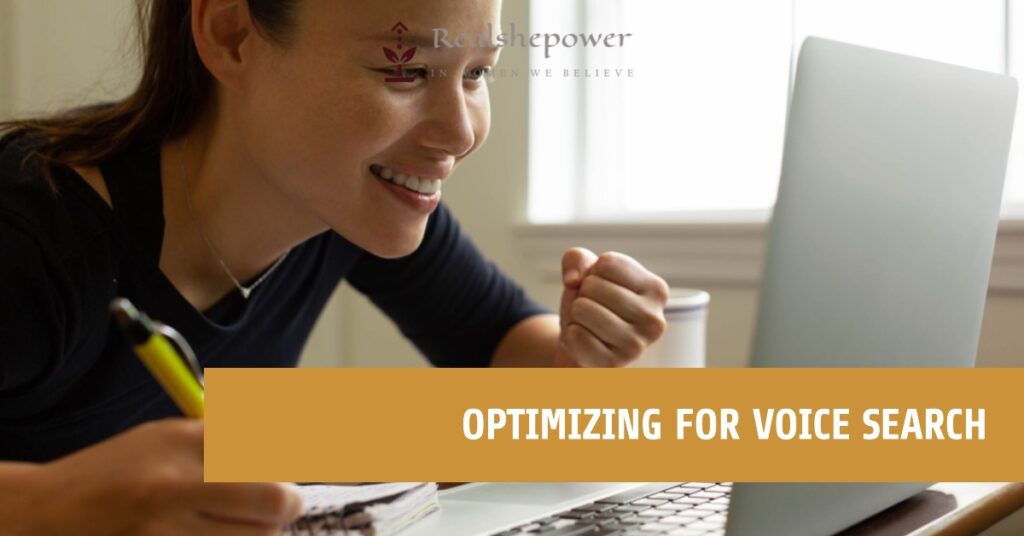
With the rise of virtual assistants and smart speakers, optimizing your web pages for voice search has become increasingly important. Voice search presents unique challenges and opportunities for web page optimization. Here’s how you can optimize your web pages for voice search:
Targeting Long-Tail Keywords and Conversational Phrases
Voice searches tend to be longer and more conversational in nature compared to text-based searches. To cater to voice search queries, focus on incorporating long-tail keywords and conversational phrases throughout your content. Consider the questions your target audience might ask and provide concise and direct answers.
Structuring Content for Featured Snippets
Featured snippets are concise summaries of web page content that appear at the top of search engine results. These snippets are often read aloud by virtual assistants in response to voice queries. To increase the chances of your web page being featured, structure your content in a way that directly answers common questions or provides valuable information.
Improving Page Speed and Mobile Optimization
Voice searches are frequently performed on mobile devices, and users expect fast and seamless experiences. Enhance your web page’s loading speed and optimize it for mobile devices to provide a frictionless experience for voice search users. Implement techniques such as compressing images, minifying code, and adopting responsive design principles.
The Future of Web Page Optimization
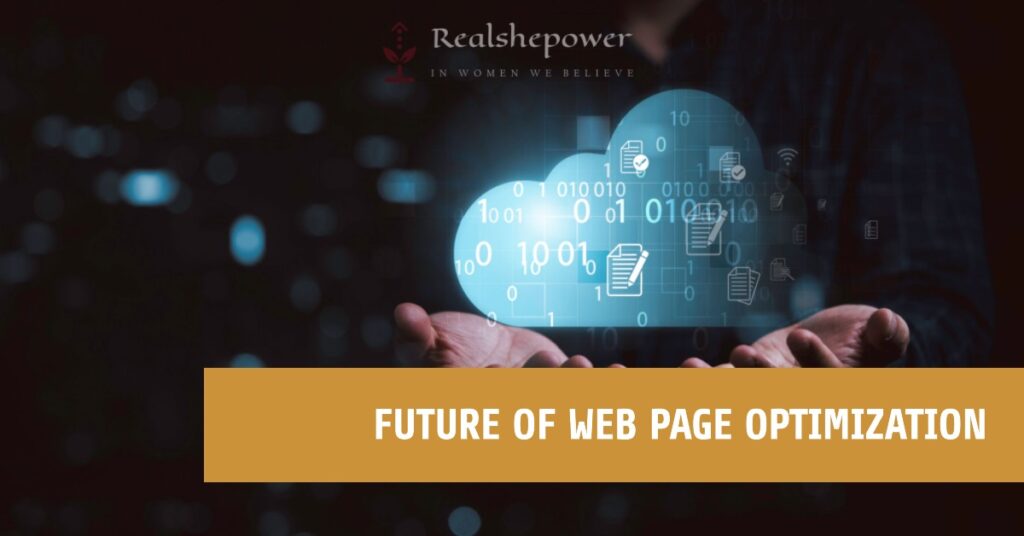
As technology evolves and user behaviors change, the landscape of web page optimization continues to evolve. Here are some emerging trends and future considerations to keep in mind:
Mobile-First Indexing
Search engines are increasingly prioritizing mobile versions of websites in their indexing and ranking algorithms. Ensure your web pages are optimized for mobile devices and offer a seamless user experience across various screen sizes.
Artificial Intelligence and Machine Learning
AI and machine learning technologies are revolutionizing web page optimization. Search engines are becoming more sophisticated in understanding user intent and delivering highly relevant search results. Stay updated on AI-powered tools and techniques to adapt to the evolving search landscape.
User Experience and Core Web Vitals
Search engines now place a strong emphasis on user experience, as reflected in the Core Web Vitals metrics. Factors such as page loading speed, interactivity, and visual stability impact your web page’s overall performance and search rankings. Prioritize optimizing these aspects to enhance user satisfaction and search engine visibility.
Local SEO Optimization
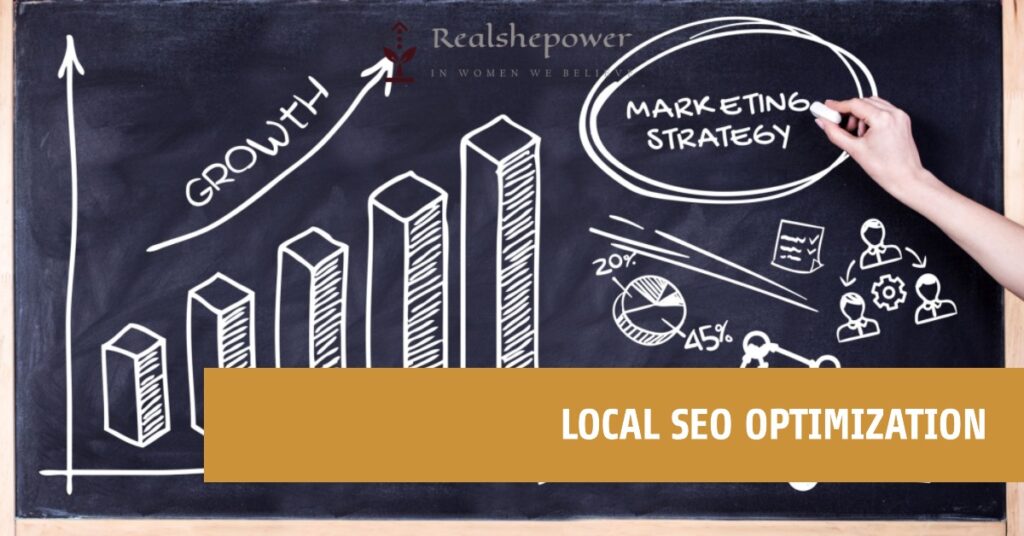
Importance of Local SEO
For businesses targeting a specific geographic area, local SEO optimization is crucial. It ensures that your web pages appear prominently in local search results, increasing your visibility among potential customers in your vicinity. Here are key strategies for local SEO optimization:
- Claim and optimize your Google My Business listing, providing accurate business information, contact details, and operating hours.
- Incorporate location-specific keywords in your web page content, meta tags, and headings to signal relevance to local searches.
- Encourage online customer reviews and respond to them promptly to build trust and credibility.
Local Citations and Directories
Building local citations and listings in reputable directories can significantly boost your local SEO efforts. Ensure that your business information, such as name, address, and phone number (NAP), is consistent across all directories. Some popular directories to consider are Yelp, Yellow Pages, and TripAdvisor.
Leveraging Local Backlinks
Obtaining backlinks from local websites and influential local businesses can enhance your local SEO. Seek partnerships and collaborations with local organizations, participate in community events, and engage in local sponsorships to earn valuable local backlinks.
User Engagement Optimization

The Importance of User Engagement
User engagement is a critical factor in web page optimization. When users spend more time on your web pages, interact with your content, and share it with others, search engines interpret these signals as indicators of quality and relevance. Enhance user engagement with the following strategies:
- Create compelling and informative content that captivates and resonates with your target audience.
- Incorporate multimedia elements, such as images, videos, and infographics, to make your content visually appealing and engaging.
- Encourage social sharing by including social media buttons and calls-to-action, enabling users to easily share your content on their preferred platforms.
Interactive Elements and Calls-to-Action
Engage your website visitors and guide them towards desired actions by incorporating interactive elements and strong calls-to-action (CTAs). These can include:
- Surveys or quizzes to gather user feedback or provide personalized recommendations.
- Interactive calculators or tools that offer value and encourage user interaction.
- Well-designed and compelling CTAs that prompt users to subscribe, download, or make a purchase.
By strategically placing interactive elements and CTAs throughout your web pages, you can drive user engagement and conversions.
Security and Website Optimization

Importance of Website Security
In an increasingly digital world, website security plays a vital role in web page optimization. Users expect their data to be protected, and search engines prioritize secure websites. Implementing robust security measures not only safeguards user information but also boosts your website’s credibility and search engine rankings.
SSL Certificates and HTTPS Protocol
Secure Socket Layer (SSL) certificates and the Hypertext Transfer Protocol Secure (HTTPS) protocol encrypt data transmitted between your website and users’ browsers, ensuring secure communication. Obtain an SSL certificate and migrate your website to HTTPS to provide a secure browsing experience and gain the trust of your visitors.
Regular Backups and Updates
Regularly backing up your website data and updating your content management system (CMS) and plugins are essential for security and optimization. Backups protect your web pages in case of data loss or hacking, while updates ensure that you have the latest features and security patches.
Mobile-Friendly Optimization

The Rise of Mobile Usage
With the proliferation of smartphones and tablets, optimizing your web pages for mobile devices is no longer a luxury but a necessity. Mobile-friendly optimization ensures that your website displays and functions seamlessly across various mobile platforms. Here are key considerations for mobile-friendly optimization:
- Implement responsive design principles to ensure that your web pages adapt to different screen sizes and orientations.
- Optimize your images and media files to reduce loading times on mobile devices.
- Streamline your navigation menus and touch elements for easy and intuitive mobile browsing.
Mobile Page Speed Optimization
Page speed is a critical factor in mobile optimization. Mobile users expect fast-loading web pages to access information quickly and efficiently. Improve your mobile page speed by:
- Compressing images to reduce file size without compromising quality.
- Minifying CSS and JavaScript files to reduce their size and improve loading times.
- Leveraging browser caching to store frequently accessed files on users’ devices.
Social Media Integration

The Power of Social Media
Integrating social media into your web pages can significantly enhance your online presence and amplify your reach. Social media platforms provide opportunities for engagement, brand exposure, and driving traffic to your website. Here’s how you can optimize your web pages for social media:
- Incorporate social media sharing buttons on your content to encourage users to share it with their networks.
- Embed social media feeds or widgets on your web pages to showcase your social media activity and increase engagement.
- Create visually appealing and shareable content that aligns with the preferences of your target audience on different social media platforms.
Structured Data Markup
Introduction to Structured Data Markup
Structured data markup is a code added to your web pages that provides additional context and meaning to search engines. It helps search engines understand the content and structure of your web pages more accurately. Implementing structured data markup offers several benefits, including:
- Enhanced search engine result display with rich snippets, knowledge graphs, and other interactive elements.
- Improved visibility in search results, increasing the likelihood of attracting clicks from users.
- Facilitated indexing and crawling of your web pages by search engine bots.
Popular Structured Data Markup Formats
There are several structured data markup formats available, including:
- Schema.org: A widely supported markup vocabulary that covers various types of content, such as articles, products, events, and reviews.
- JSON-LD (JavaScript Object Notation for Linked Data): A lightweight and flexible markup format that can be easily implemented on web pages.
Implementing structured data markup involves adding relevant schema tags to your HTML code, providing detailed information about your content and its context.
Website Accessibility Optimization
The Importance of Website Accessibility
Website accessibility ensures that people with disabilities can access and navigate your web pages effectively. It not only promotes inclusivity but also improves user experience and search engine optimization. Consider the following strategies for website accessibility optimization:
- Use descriptive alt tags for images, providing text alternatives for visually impaired users.
- Provide clear and consistent headings and subheadings to aid screen readers and assistive technologies.
- Ensure proper color contrast for text and background elements to enhance readability for visually impaired individuals.
- Implement keyboard navigation functionality to facilitate easy navigation for users who cannot use a mouse.
Continuous Monitoring and Optimization
The Iterative Nature of Optimization
Web page optimization is an ongoing process that requires continuous monitoring and refinement. Keep track of key metrics, user feedback, and industry trends to identify areas for improvement and adapt your strategies accordingly. Consider the following practices for continuous optimization:
- Monitor web analytics data to assess the performance of your web pages, identifying trends and areas for improvement.
- Conduct user surveys or gather feedback to gain insights into user preferences and pain points.
- Stay updated with the latest SEO trends, algorithm changes, and emerging technologies to stay ahead of the competition.
By adopting a proactive and iterative approach to optimization, you can ensure that your web pages remain effective, relevant, and competitive in the ever-changing digital landscape.
FAQs about Web Page Optimization
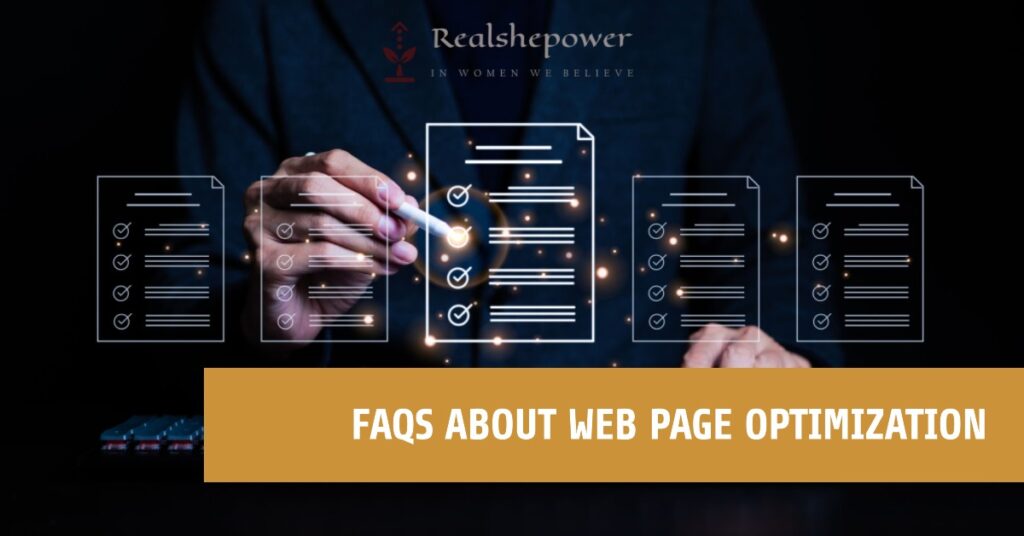
Q: How long does it take to see results from web page optimization efforts?
A: Web page optimization is an ongoing process, and it may take several weeks or even months to see significant results. Patience and consistency are key.
Q: Is web page optimization only for large websites?
A: No, web page optimization is beneficial for websites of all sizes. Regardless of your website’s scale, optimization strategies can help you improve visibility and attract more visitors.
Q: Can I perform web page optimization myself, or should I hire a professional?
A: You can certainly implement basic optimization techniques yourself. However, for more advanced strategies and to maximize results, it’s advisable to consult an experienced SEO professional.
Q: Is web page optimization a one-time process, or should it be an ongoing effort?
A: Web page optimization is an ongoing process. Search engine algorithms evolve, user behaviors change, and competitors adapt. To maintain your visibility and competitiveness, it’s important to continually optimize and update your web pages.
Q: How long does it take to see results from web page optimization?
A: The timeline for seeing results can vary based on various factors, including the competitiveness of your industry, the quality of your optimization efforts, and the search engine algorithms. Generally, it takes time for search engines to crawl and index your web pages. It’s important to be patient and consistently implement optimization strategies to see improvements over time.
Q: Are there any risks involved in web page optimization?
A: When done correctly, web page optimization is a safe and legitimate practice. However, it’s important to avoid unethical tactics such as keyword stuffing, cloaking, or buying low-quality backlinks. These practices can lead to penalties from search engines and damage your online reputation. Stick to white hat SEO techniques that focus on providing value to users and adhering to search engine guidelines.
Q: Can web page optimization guarantee the top spot in search engine rankings?
A: While web page optimization can significantly improve your rankings, it does not guarantee the top spot. Search engine rankings depend on various factors, including competition, user preferences, and search engine algorithms. However, effective optimization increases your visibility and the likelihood of appearing higher in search results, attracting more organic traffic to your web pages.
Q: Should I focus solely on search engine optimization or prioritize user experience?
A: Balancing both search engine optimization and user experience is crucial. While it’s important to optimize your web pages for search engines to ensure visibility, it’s equally important to provide a seamless and enjoyable experience for your website visitors. Strive for a user-centric approach, where your optimization efforts enhance the user experience rather than hinder it.
Q: Can web page optimization help me outrank my competitors?
A: Web page optimization can certainly give you a competitive edge. By conducting thorough keyword research, creating high-quality content, building authoritative backlinks, and optimizing various technical aspects, you can improve your rankings and visibility. However, the competitiveness of your industry and the strategies employed by your competitors also play a role. It’s important to continuously analyze and refine your optimization strategies to stay ahead.
Q: Is it necessary to hire an SEO professional for web page optimization?
A: While basic optimization techniques can be implemented by website owners, hiring an SEO professional can provide valuable expertise and save you time and effort. SEO professionals have in-depth knowledge of the latest optimization trends, industry best practices, and advanced tools. They can tailor strategies to your specific needs, conduct thorough analyses, and help you achieve optimal results.
Q: Can web page optimization benefit all types of websites, including e-commerce, blogs, and informational sites?
A: Absolutely! Web page optimization benefits websites of all types and sizes. Whether you run an e-commerce store, a blog, or an informational website, optimizing your web pages can increase visibility, attract targeted traffic, and improve overall performance. The specific optimization strategies may vary based on the nature of your website, but the principles remain the same.
Q: Is it possible to optimize my web pages for multiple search engines?
A: Yes, web page optimization techniques generally apply to multiple search engines. While Google is the dominant search engine, other search engines like Bing and Yahoo also consider similar factors when ranking web pages. By following optimization best practices and focusing on providing value to users, you can improve your visibility across various search engines.
Q: How frequently should I update my web page optimization strategies?
A: Web page optimization is an ongoing process that requires regular evaluation and adjustment. As search engine algorithms evolve and user behaviors change, it’s important to stay up-to-date with the latest trends and techniques. Periodically review your optimization strategies, conduct keyword research, monitor your website’s performance, and adapt your approach accordingly to maintain a competitive edge.
These FAQs provide answers to common questions about web page optimization. By understanding the principles and strategies behind optimization, you can effectively enhance your web pages and achieve your online goals.
Harness the Power of Web Page Optimization for Success

Web page optimization is a multifaceted discipline that empowers businesses and individuals to enhance their online visibility, attract more visitors, and achieve their goals. By understanding the foundations of optimization, embracing advanced strategies, and staying abreast of emerging trends, you can position your web pages for success in the ever-evolving digital landscape. So, implement these optimization techniques, adapt to the changing needs of your audience, and watch your web pages thrive in the vast expanse of the internet. Happy optimizing!
Unlock the Secrets of SEO: How to Rank Higher on Google and Boost Your Online Visibility
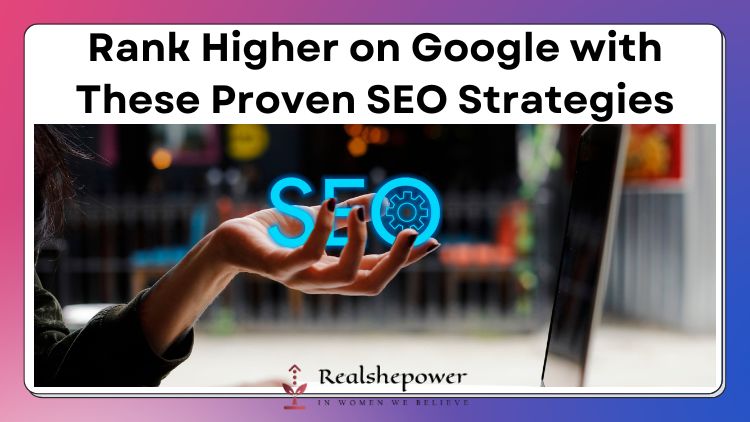
Are you tired of being buried on page two or three of Google’s search results? It’s time to unlock the secrets of SEO and take your website to the top. By following these proven strategies, you can improve
You can now write for RSP Magazine and be a part of the community. Share your stories and opinions with us here.
